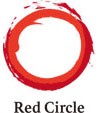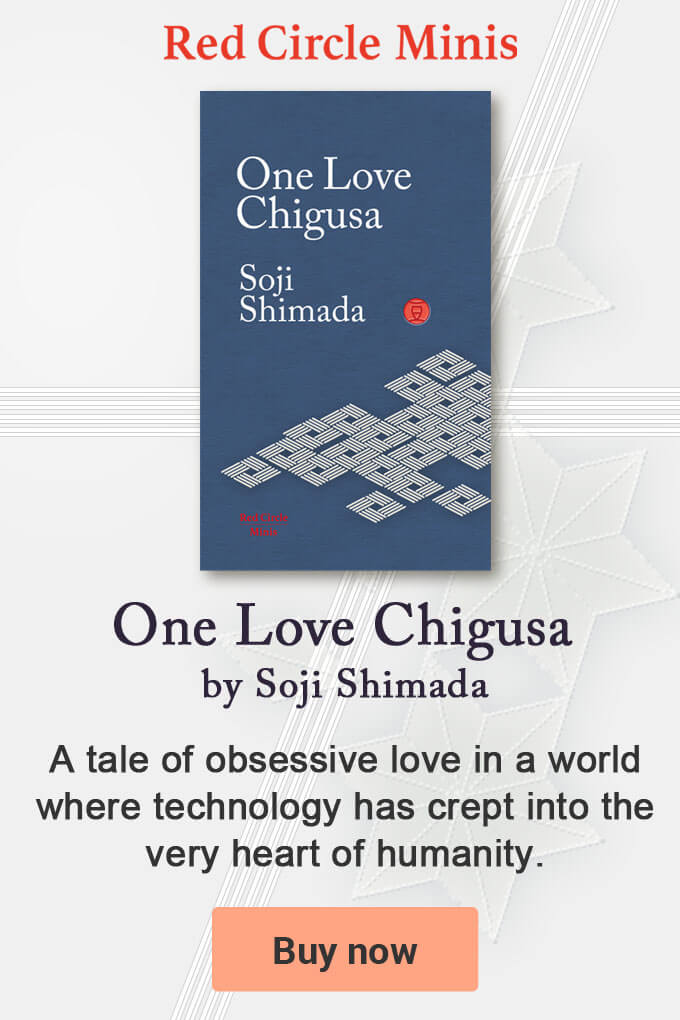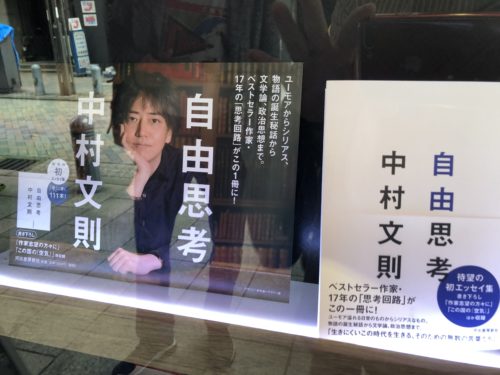 Promotional display at Tokyo bookshop for Freethinking, a collection of 111 essays by Fuminori Nakamura. Photograph: Red Circle Authors Limited.
Promotional display at Tokyo bookshop for Freethinking, a collection of 111 essays by Fuminori Nakamura. Photograph: Red Circle Authors Limited.According to Nakamura, today’s Japan is step by step slowly losing its freedoms, but despite this, the inside of our heads, our minds, are free, and his fascinating collection of 111 essays, Freethinking, celebrates freedom of thought and expression.
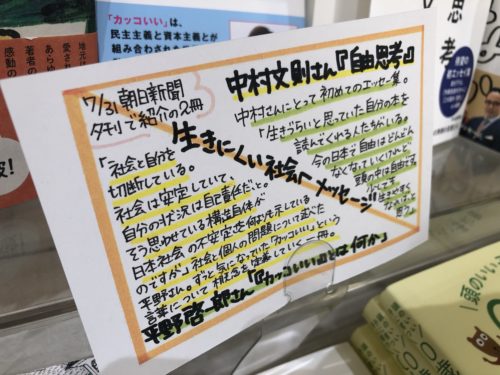 In-store promotion for Freethinking by the award-winning Japanese author, Fuminori Nakamura. His first published collection of essays, published in July 2019 by Kawade Shobo Shinsha. Photograph: Red Circle Authors Limited.
In-store promotion for Freethinking by the award-winning Japanese author, Fuminori Nakamura. His first published collection of essays, published in July 2019 by Kawade Shobo Shinsha. Photograph: Red Circle Authors Limited.A novel which The Wall Street Journal described as: “A thriller in the same elevated sense as is Dostoevsky’s Crime and Punishment or Camus’s The Stranger . . . Nature versus nurture, free will versus fate: Such are the themes that flicker almost subliminally through this shocking narrative, which also emits echoes of Poe and Mishima.”
Nakamura, who is now known mostly for the chilling dystopian societies he depicts in some of his works, hopes that this collection will help, in a small way, all the people who have enthusiastically read his books so far to live more easily, and freely.
The essays are board spanning humour and serious topics including politics, society’s ills, as well as advice for aspiring writers, and his thoughts on Eiichiro Oda’s famous Japanese manga One Piece.
Examples of some of the titles of the essays included in the 296-page collection are: My reading of Crime and Punishment; In Kyoto, Quotable quotes from adult films; Eliminating discrimination; International book festivals, and The nation’s air, to list just six of the myriad topics Nakamura covers in his delightful and highly intelligent miscellany.
Nakamura is on record as saying he is not planning to publish any more essays for five to ten years, making this collection a rare and long sought after opportunity to read the thoughts of one of Japan’s most exciting, intelligent and captivating authors.
“A single book spreads little by little, afterwards, like the seed of a grain which has fallen onto the ground. Even if we can’t change the world dramatically, we can stop some terrible things from happening, or change the direction in which we are heading by 0.01 degrees. While I was writing this book, I kept having this feeling. Books have a role that can only be done by books,” Nakamura writes in Freethinking.
Freethinking published on 5 July 2019 has been reviewed by major Japanese publications such as the Asahi Shimbun, one of Japan’s most prestigious newspapers and The Sankei News, and is already receiving excellent feedback and acclaim. Freethinking, 自由思考, is currently only available in Japanese.
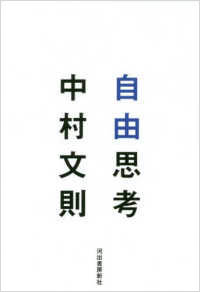 Cover of Freethinking, 自由思考, a collection of 111 essays by the award-winning Red Circle author, Fuminori Nakamura.
Cover of Freethinking, 自由思考, a collection of 111 essays by the award-winning Red Circle author, Fuminori Nakamura. About Red Circle:Red Circle Authors Limited is a specialist publishing and communications company that conducts bespoke projects on behalf of a carefully selected and curated group of leading Japanese authors. Red Circle showcases Japan’s best creative writing. For more information on Red Circle, Japanese literature, and Red Circle authors please visit: www.redcircleauthors.com.
About Red Circle:Red Circle Authors Limited is a specialist publishing and communications company that conducts bespoke projects on behalf of a carefully selected and curated group of leading Japanese authors. Red Circle showcases Japan’s best creative writing. For more information on Red Circle, Japanese literature, and Red Circle authors please visit: www.redcircleauthors.com.

